The specter of a two-front war bleakly confronts Israel as it prepares to launch a massive invasion of the Gaza Strip in an attempt to topple the pro-Iranian Hamas regime, destroy its military infrastructure, capabilities and network of tunnels, and kill its leaders and foot soldiers.
While Israel appears ready to deal Hamas a crushing and irrevocable blow, Iran, Hamas’ chief foreign backer, has voiced full-throated support for Hamas and reportedly sent Israel a message through the United Nations that it will intervene in the ongoing conflict should there be an Israeli ground invasion.
In conversations with the presidents of Russia and Turkey yesterday, Iranian President Ebrahim Raisi warned that the current war could spill into “other fronts,” suggesting that Iran might become directly involved.
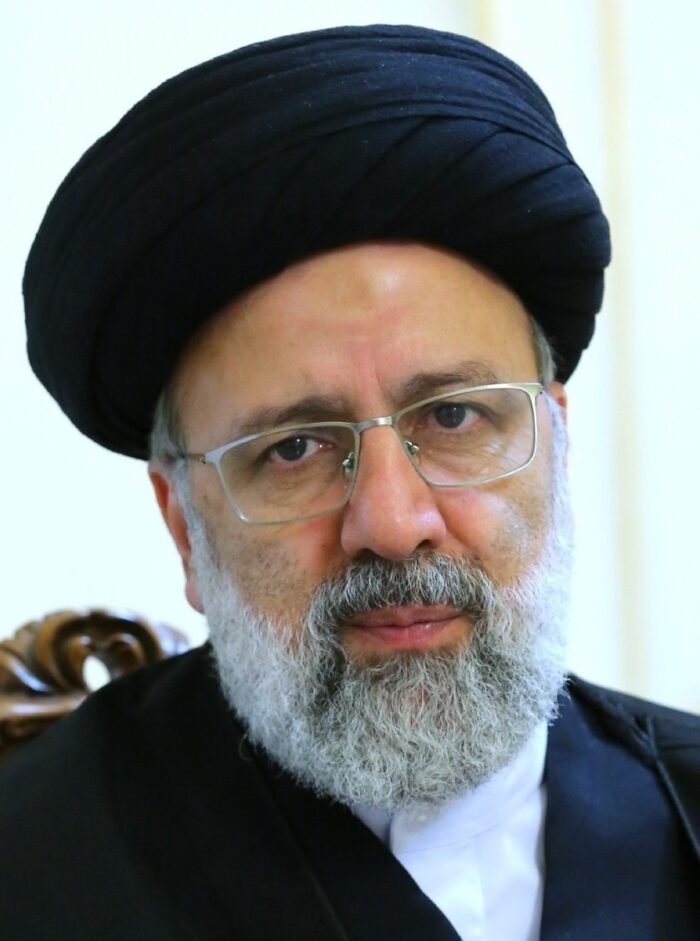
And on a tour of Iraq, Syria, Lebanon and Qatar late last week, Iranian Foreign Minister Hossein Amir Abdollahian, said that an Israeli incursion into Gaza could well suck Iran and its compliant Lebanese proxy, Hezbollah, into what would be a regional war and ignite a “a huge earthquake.”
During his tour, Amir Abdollahian met the leaders of Hamas, Hezbollah and Syria, Ismail Haniyeh, Hassan Nasrallah and Bashar al-Assad.
On October 16, he issued another dire warning, saying that Iran could open “multiple fronts” against Israel. “The possibility of preemptive action by the resistance axis is expected in the coming hours,” he said.
Amir Abdollahian delivered these threatening comments about a week after a force of some 3,000 Hamas terrorists stormed into southern Israel and murdered 1,400 Israeli civilians and soldiers in an unprecedented bloodbath and kidnapped 199 Israelis to hold as hostages.
Hamas’ murderous rampage set off the fifth and most deadly Israel-Hamas war in 15 years, during which the Israeli Air Force has struck 4,200 targets in Gaza and Hamas has fired 6,300 rockets at Israeli towns and cities, most of which have been intercepted by the Iron Dome missile defence system.
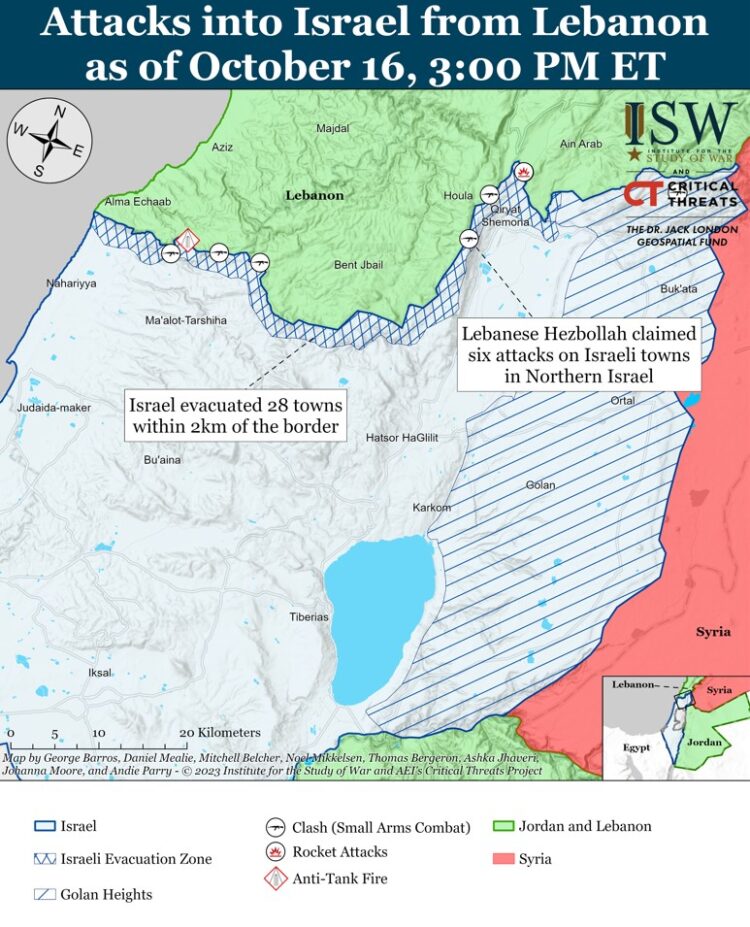
In the face of Iran’s veiled threats, Hezbollah and Hamas’ Lebanese affiliate have initiated a succession of fairly low-level clashes along the Lebanese border with Israel.
Hezbollah’s unbridled aggression has mostly taken the form of anti-tank missile, rocket and mortar attacks in the vicinity of Mount Dov, Metulla and Nahariya and resulted in the deaths of four soldiers, including a lieutenant colonel, and one civilian in the town of Shtula.
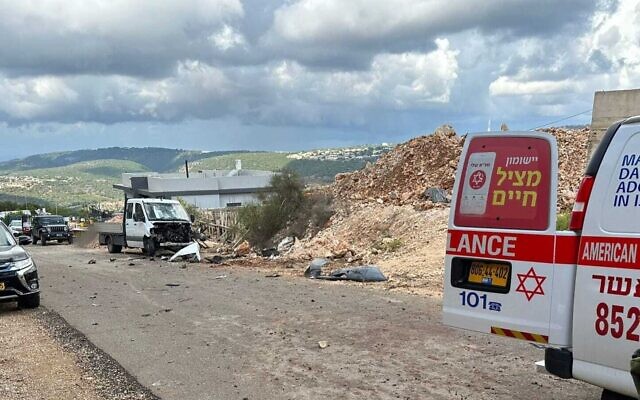
These clashes, which have prompted Israel to deploy the Iron Dome, have been the deadliest since the 2006 war in Lebanon. In proportional responses, the Israeli army and air force have shelled, bombed and fired armed drones at Hezbollah positions, killing five Hezbollah and five Palestinian terrorists.
Under normal circumstances, Israel would have reacted ferociously to these blatant and unprovoked provocations, which are designed to take the pressure off Hamas in Gaza, compel Israel to agree to a hasty ceasefire, and leave the status quo in place in Gaza.
But because Israel would rather not fight a two-front war, it has exercised immense restraint in responding to Hezbollah’s flagrant aggression.
In the past week, however, the Israeli Air Force has bombed Aleppo International Airport twice and Damascus International Airport once, putting them temporarily out of service. Israel targeted these Syrian airports because Iran, a close ally of Syria, uses them to move weapons and munitions into Syria, which in turn transfers them to Hezbollah in Lebanon.
In the meantime, Israel has bolstered its forces in the northern Galilee, declared a closed military area there, and evacuated the residents of 28 villages and towns within a two kilometre radius of Lebanon. These range from Dishon, Kfar Yuval, Margaliot and Avivim to Yiftah, Malkia, Misgav Am and Yir’on.
With the northern front heating up, Prime Minister Benjamin Netanyahu issued a warning to Hezbollah and Iran yesterday, urging them not to intervene. “Don’t try us, you will be severely harmed,” he said.
An Israel Defence Forces spokesman, Rear Admiral Daniel Hagari, warned Hezbollah on October 16 that it would face a “deadly” response if it continued to attack Israel.
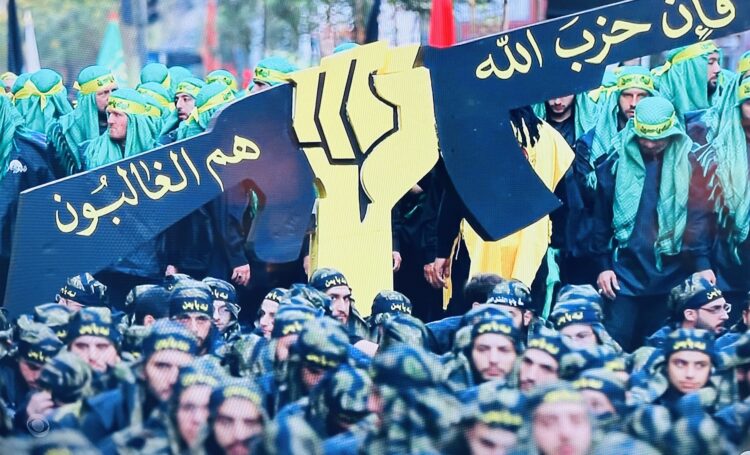
“Hezbollah carried out a number of attacks yesterday in order to try to divert our operational efforts (away from Gaza), under the direction and backing of Iran, while endangering the state of Lebanon and its citizens,” he said. “We have increased our forces on the northern border and will respond aggressively to any activity against us. If Hezbollah dares to test us, the reaction will be deadly. The United States is giving us full backing.”
The U.S. has indeed backed Israel unwaveringly. President Joe Biden has extended full support and announced he will visit Israel on October 18. Secretary of State Antony Blinken and Secretary of Defence Lloyd Austin already have paid solidarity visits to Israel.
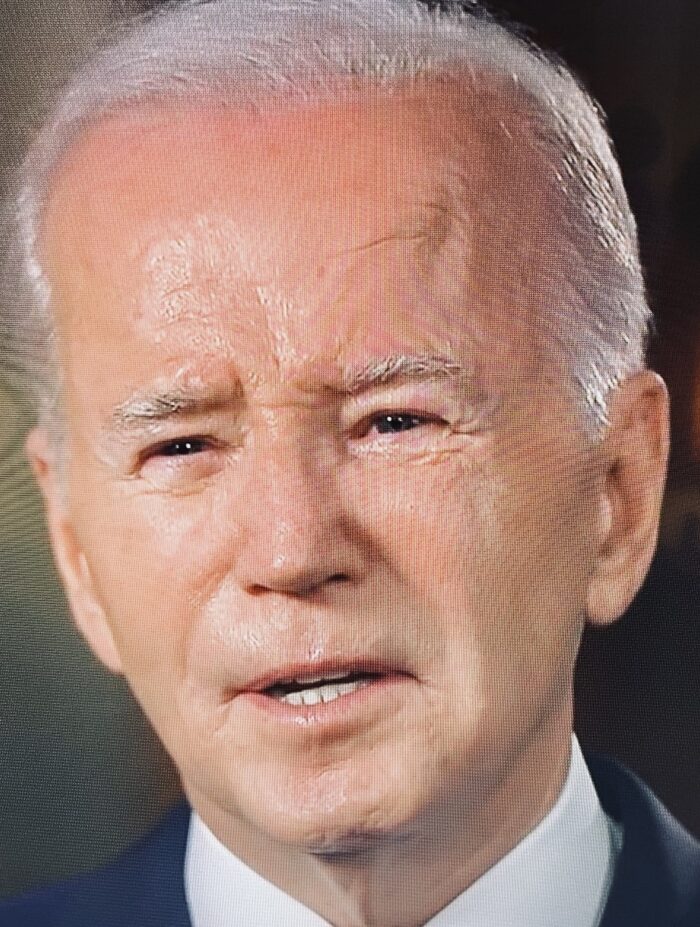
Attempting to head off a two-front war, which could easily draw in Iran and its proxies from Lebanon, Syria, Iraq and Yemen, the Biden administration has warned Hezbollah to desist from joining the war. It has also sent messages to Iran through intermediaries in Qatar, Oman and China warning against escalation.
Despite U.S diplomacy, there is no guarantee that Hezbollah and Iran will heed these warnings. “We can’t rule out that Iran would choose to get directly engaged some way,” said Biden’s national security advisor, Jake Sullivan, on October 15.
In addition, the United States has dispatched two aircraft carrier groups to the eastern Mediterranean Sea, near the coast of Israel, to deter Hezbollah and Iran, as well as a contingent of 2,000 Marines and sailors. The Biden administration is also processing a $10 billion military aid package to Israel.
Prior to the latest crisis in the Middle East, Israel and Hezbollah were embroiled in an escalating war of words. Over the past few months, Hezbollah created a series of border incidents intended to sow fear and mislead Israel into the mistaken belief that Gaza posed no threat to its national security.
Hezbollah rejects the United Nations-mandated Blue Line, which demarcates Lebanon’s land border with Israel, and claims ownership of Shebaa Farms (Mount Dov), a tiny enclave on the Golan Israel captured during the 1967 Six Day War.

Amid the growing tension, Israeli Defence Minister Yoav Gallant threatened Nasrallah. In a video message, Gallant said, “You have made mistakes in the past, you have paid very heavy prices. If an escalation or conflict develops here, we will return Lebanon to the Stone Age. We will not hesitate to use all our power to erode every inch of Hezbollah and Lebanon if we have to. Don’t mistake us, we don’t want war, but we are ready to protect our citizens, our soldiers, and our sovereignty.”
By way of reaction, a senior Hezbollah commander, Haji Jihad, warned Israel that their next war would unfold in the Galilee rather than in Lebanon.
“The Israeli army lacks fighting spirit,” he claimed. “This is not based on the word of the Islamic resistance, but according to the Zionists themselves, who do not trust it,” he added in a reference to reports that Israeli reservists would shun voluntary duty due to their opposition to Netanyahu’s proposal to overhaul the judiciary.
On August 14, Nasrallah weighed on, claiming that Israel would “cease to exist” if another Israel-Hezbollah war breaks out. In a televised speech, he said, “The Israeli army today is in its worst shape in history … You, too, will be returned to the Stone Age.”
Nasrallah boasted that Hezbollah’s high-precision missiles can destroy Israeli civilian and military targets, including airports, air force bases, power stations and even the Dimona nuclear reactor.
In the wake of the last war in Lebanon, Nasrallah voiced regret for having started it. But 17 years on, he appears undeterred and eager to confront Israel in another war. The weak and ineffectual Lebanese government will be powerless to stop Hezbollah, a state-within-a-state in Lebanon.
Should a new war erupt, Israel would probably carpet bomb southern Lebanese villages and towns, Hezbollah’s base, and demolish Lebanon’s infrastructure. For the past few years, Lebanon has been afflicted by a profound economic crisis, and its grave problems would be doubly compounded by a new war.
Nasrallah will surely have to take these compelling factors into serious consideration before he jumps into an empty swimming pool.
